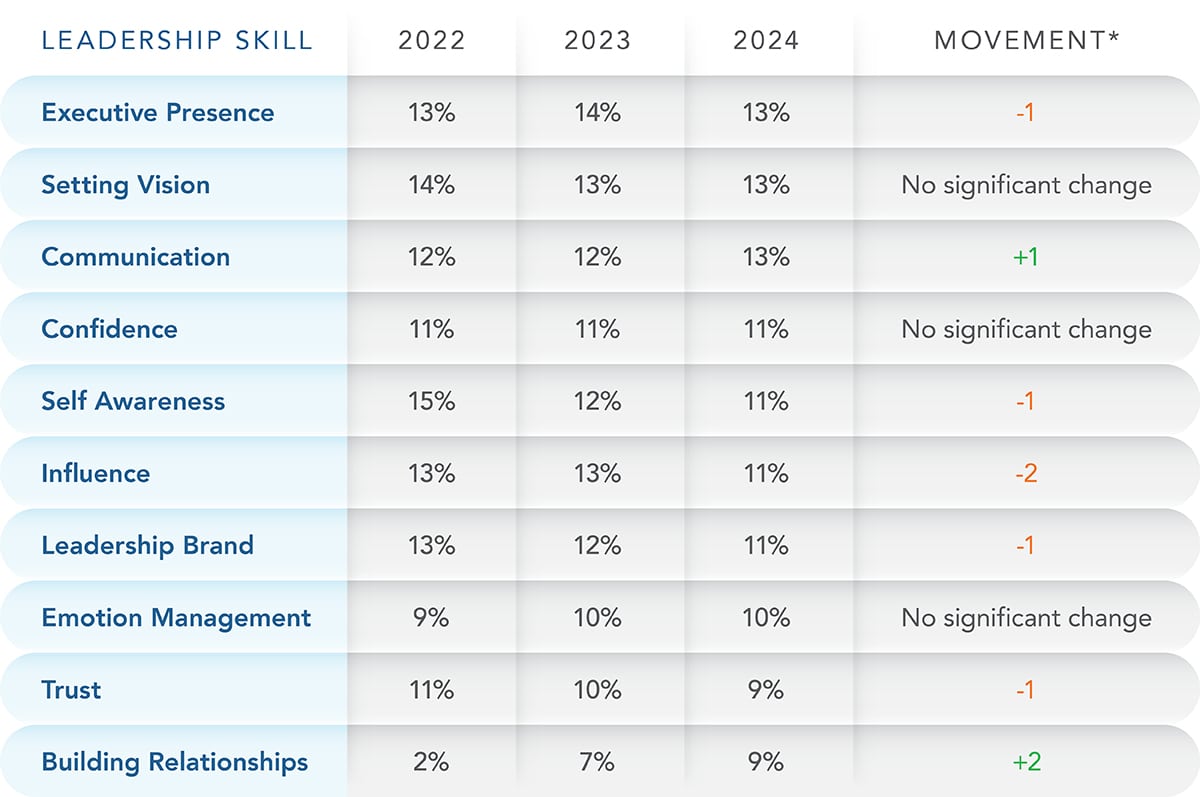As we cross into the second half of 2024, AIIR has uncovered a compelling trend among the skills leaders are developing. Amid the evolving landscape of hybrid work, one skill is quickly gaining more prominence: Building Relationships. This skill has surged by 2 points since 2023 and an impressive 9 percentage points since 2022, signaling a shift in how we achieve success in today’s dynamic work environment.
Defining Building Relationships
Building Relationships is defined as cultivating connections with individuals who can help achieve work-related goals and establish advantages. It involves the proactive investment in establishing mentor-mentee, sponsorship, or partnership relationships. Within the AIIR Leadership Framework, this skill falls under Social Acumen in the Leading Others domain. Leading Others involves achieving results with and through others, requiring the ability to build and maintain effective relationships, manage performance, and drive team success.
Why is Building Relationships Suddenly So Important?
AIIR asked its global cadre of leadership experts how they are seeing the rise in this skill in their work with leaders. The rise in the importance of Building Relationships can be attributed to several factors, with two of note:
Leaders are (Still) Adapting to Remote and Hybrid Work
The shift to hybrid work environments has reduced opportunities for casual interactions, making deliberate relationship-building crucial. During the pandemic, the emphasis on building relationships may have waned, but as hybrid work becomes the norm, fostering these connections is essential for effective collaboration and productivity.
Bernice Ang noted, “The rise of remote and hybrid work models has made it crucial for leaders to find new ways to build and maintain relationships without the benefit of in-person interactions. Work tends to be more transactional vs. relational. This requires new skills and strategies to ensure team cohesion and engagement.”
Rosa Grunhaus Belzer added, “During COVID, the focus was on productivity. With the return to office/hybrid/remote work schedules, people and organizations realized they had to focus on connectivity. This continues to be a work in progress, as connectivity is more complex than prior to COVID, and the formula to balance productivity with connectivity is not an easy one.”
A Complex Cross-Functional Landscape
The increasingly complex and interconnected business landscape requires leaders to navigate various stakeholders and build strong relationships to manage these complexities effectively. Leaders need to foster cross-functional collaboration and shift from an individual-centric approach to a team-oriented mindset.
Marilyn Carroll observed, “The business world is more interconnected than ever. Success often depends on networks and partnerships. Leaders who build and maintain strong relationships are better positioned to create valuable alliances and seize opportunities.”
Jay Fehnel shared, “I have seen ‘building productive professional relationships’ as a development priority for roughly 60% of my senior leaders in the last 18 months. It has definitely become a more common goal than it was pre-pandemic. In most cases, I find that the most pressing need is better relationships across with peers and near-peers and function-center leaders, where there is often less control, less deference, and more conflicting business and career goals. Add on the general pressure of business, and peer relationships often end up being weak, combative, or non-existent.”
Why Building Relationships at Work is Absolutely Essential for Leaders
Strong relationships at work lead to increased trust, better communication, and improved team performance. They are foundational for creating a positive and productive work environment. Leaders who excel in building relationships are better equipped to motivate their teams, navigate challenges, and drive organizational success.
Research highlighted in the Harvard Business Review by Emma Seppälä and Nicole K. McNichols underscores the power of healthy relationships at work. Leaders who prioritize relationships and lead with positivity and kindness foster greater employee engagement, loyalty, and productivity. According to their findings, the most effective leaders are transparent, compassionate, and values-driven, recognizing employees as unique individuals.
AIIR’s own research on the topic of Social Acumen echoes these sentiments, emphasizing that relationships are the social capital of organizational life. Whether it’s with mentors, sponsors, partners, competitors, or mentees, each type of relationship plays a critical role in advancing both organizational and career goals.
Leadership Skills Movement
AIIR’s data shows the following trends in AIIR’s top 10 leadership skills from 2022 to 2024. As the chart below shows, while skills like Executive Presence and Influence decreased year over year, Building Relationships has emerged as a critical focus for the leaders we coach.
*indicates change from 2023-2024
Conclusion
As the landscape of work continues to evolve, the ability to build and maintain strong relationships has never been more crucial. Leaders who prioritize and develop this skill will not only navigate the complexities of today’s business environment more effectively but also drive greater success for their organizations.
Are You Ready To Shape A Better Future Together?
Partner with AIIR to empower your leaders and ascend into the future.

